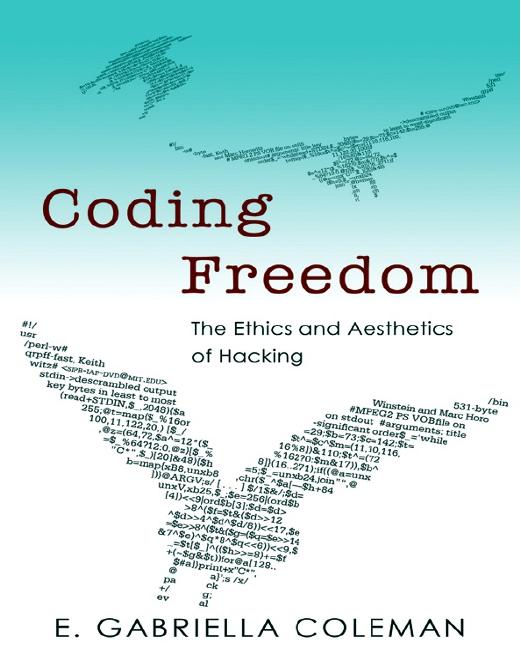Coding Freedom: The Ethics and Aesthetics of Hacking by E. Gabriella Coleman

Author:E. Gabriella Coleman [Coleman, E. Gabriella]
Language: eng
Format: epub, pdf
Tags: COM051000
Publisher: Princeton University Press
Published: 2012-10-09T23:00:00+00:00
CHAPTER 4
Two Ethical Moments in Debian
F/OSS projects largely take place on the Internet. Varying in size from a couple of developers to a network of over one thousand, they are sites where programmers coordinate and produce high-quality software. A growing body of literature has addressed questions of developer motivation (Raymond 1999), project structures, and changing implications for software development along with factors that lead to success and failures in projects (Crowston and Howison 2005; O’Mahony and Ferraro 2007; Schweik and English 2012), open-source legality (McGowan 2001; Vetter 2004, 2007), utilitarian and rational choice incentive structures (Gallaway and Kinnear 2004; Lancashire 2001; von Hippel and von Krogh 2003), the economics of open-source software (Lerner and Tirole 2001; Lerner and Schankerman 2010; von Hippel 2005), and the noneconomic incentive mechanisms, cultural norms, and broader sociopolitical implications of F/OSS production (Benkler 2006; Berry 2008; Chopra and Dexter 2007; Ghosh 1998; Himanen 2001; Kelty 2008; Kollock 1999; Lessig 1999; Weber 2004).
Although a number of these studies tangentially discuss ethical questions (e.g., conflict resolution within F/OSS projects), they rarely address how developers commit themselves to an ethical vision through, rather than prior to, their participation in a F/OSS project. Much of the F/OSS literature, in other words, is heavily focused on the question of motivation or incentive mechanisms, and often fails to account for the plasticity of human motivations and ethical perceptions.
Many of these authors acknowledge the importance of shared norms, and usually address this by referring to or quoting the famous passage in Levy’s Hackers where he defines the tenets of the hacker ethic. In a general sense, these principles still powerfully capture the spirit of ethical commitments. Nevertheless, by leaning so heavily on Levy, what we miss is how these precepts take actual form and how they change over time. The literature, crucially, has tended to ignore how hacker commitments are transformed by the lived experiences that unfold within F/OSS projects.1
This chapter uses the Debian project to demonstrate how free software development is not simply a technical endeavor but also a moral one. The analysis is informed by the work of the legal theorist Robert Cover, who examines the ways that “jurisgenesis,” the production and stabilization of inhabited normative meanings, requires an ongoing and sometimes conflicting interpretation of codified textual norms. “Some small and private, others immense and public,” these continual acts of reinterpretation and commitment establish what Cover (1993, 95) calls a nomos:
Download
Coding Freedom: The Ethics and Aesthetics of Hacking by E. Gabriella Coleman.pdf
This site does not store any files on its server. We only index and link to content provided by other sites. Please contact the content providers to delete copyright contents if any and email us, we'll remove relevant links or contents immediately.
| Coding Theory | Localization |
| Logic | Object-Oriented Design |
| Performance Optimization | Quality Control |
| Reengineering | Robohelp |
| Software Development | Software Reuse |
| Structured Design | Testing |
| Tools | UML |
The Mikado Method by Ola Ellnestam Daniel Brolund(23280)
Hello! Python by Anthony Briggs(22434)
Secrets of the JavaScript Ninja by John Resig Bear Bibeault(21172)
Dependency Injection in .NET by Mark Seemann(20227)
Kotlin in Action by Dmitry Jemerov(20223)
The Well-Grounded Java Developer by Benjamin J. Evans Martijn Verburg(20110)
OCA Java SE 8 Programmer I Certification Guide by Mala Gupta(19335)
Algorithms of the Intelligent Web by Haralambos Marmanis;Dmitry Babenko(18139)
Grails in Action by Glen Smith Peter Ledbrook(17266)
Adobe Camera Raw For Digital Photographers Only by Rob Sheppard(16969)
Test-Driven iOS Development with Swift 4 by Dominik Hauser(11151)
Becoming a Dynamics 365 Finance and Supply Chain Solution Architect by Brent Dawson(8071)
Microservices with Go by Alexander Shuiskov(7835)
Practical Design Patterns for Java Developers by Miroslav Wengner(7735)
Test Automation Engineering Handbook by Manikandan Sambamurthy(7697)
Angular Projects - Third Edition by Aristeidis Bampakos(7181)
The Art of Crafting User Stories by The Art of Crafting User Stories(6635)
NetSuite for Consultants - Second Edition by Peter Ries(6551)
Demystifying Cryptography with OpenSSL 3.0 by Alexei Khlebnikov(6324)
